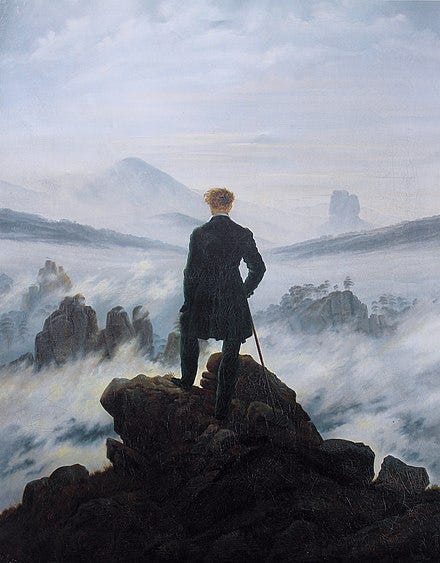In Defense of Being Alone
Keeping to yourself is a perfectly rational way of avoiding the tyranny of groups.
Whenever a series of mass shootings occur, media attention turns to various social and psychological reasons for why people might behave in such a vile manner. At the top of the list sit the so-called epidemics of “loneliness” and “social isolation” that are used to explain every bad action in America from shootings and violence to suicide and drug addiction to rising extremism and hate crimes.
The profiles of mass killers and extremist weirdos generally fit this theory—usually socially isolated men with past trauma spending way too much time online building paranoid and violent fantasies of retribution against perceived personal or societal enemies. Given the number of mass shootings and other extremist acts in America today, legislators and law enforcement officials would be wise to heed these warnings and strengthen red-flag laws to prevent violence carried out by people who fit this profile and engage in known anti-social and illegal behavior.
Beyond the negative contributions of loneliness and isolation to mass shootings and other social disorders, the issue of being alone becomes more complicated.
According to new Census data on time use examined by Bryce Ward in The Washington Post, Americans across demographic lines are spending more and more time alone. This rising trend of alone time is not merely the result of pandemic lockdowns: “Our social lives were withering dramatically before Covid-19. Between 2014 and 2019, time spent with friends went down (and time spent alone went up) by more than it did during the pandemic.” Notably, decisions to spend less time with friends and companions over this period did not result in Americans spending more time with spouses, partners, or children. “Instead, people chose to be alone,” as Ward explains it.
Many commentators, including Ward, argue that this increasing alone time by Americans is manifestly worrisome and must be reversed. These are fair points given the need to prevent the negative social outcomes cited above and to promote the clear personal benefits of having genuine friendships.
However, what if the increase in choosing to be alone isn’t necessarily a sign of dystopia but rather a sign of rational action in defense of individuality and personal freedom in a world of increasingly oppressive social groups?
It’s no accident that the period covered here, from 2014 to 2021, includes the dramatic rise in social media use, nonstop opinion spouting and preening by the worst kind of people online, and a steady stream of disruptive political events in America that forced people everywhere to choose sides in all manner of ideological conflicts—without any doubts about these decisions. In-person social networks and larger institutions in turn became insufferable embodiments of these online developments with aggressive know-it-alls dominating groups and enforcing adherence to select views with little dissent allowed. Persuasion was superseded by rhetorical pounding.
This off-putting type of norm enforcement by domineering people is regularly seen on Twitter, Instagram, Facebook, and TikTok. It also pops up increasingly during a night out with friends or neighbors, at a happy hour gathering or project meeting among work peers, or in other religious, educational, or professional group contexts. Social cohesion today is maintained less through affinity to a collective set of values or activities and more through social disapproval and shunning of those who do not go along. Subsequently, the social and workplace consequences of disagreeing with whatever ideas are determined to be acceptable by the in-group at any given time have become increasingly risky for many people.
Perhaps a rising number of Americans experienced this social group tyranny over the past decade and decided: “I’m out.” Why go through the pain and anxiety of capitulating to dogmatic people who dominate group environments when you could be on your own doing what you want, thinking about politics and the world in your own way, or just doing nothing and taking the dog for a walk, reading a book, or listening to music? Life is too short to put up with annoying behavior from others, which is increasingly the norm in many group settings today.
Of course, if someone chooses to be alone and then spends all their time online or in destructive social media circles then the cure could end up being worse than the malady. The point is to get away from toxic groupthink and inflexibility. But done for the right reasons, and in a sound manner, choosing to be alone may be a healthy sign of well-adjusted Americans deciding to live on their own terms free from the oppression of others.
Introverts of the world unite—but not for too long or with too many people!




